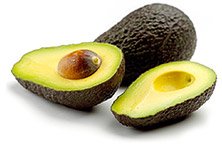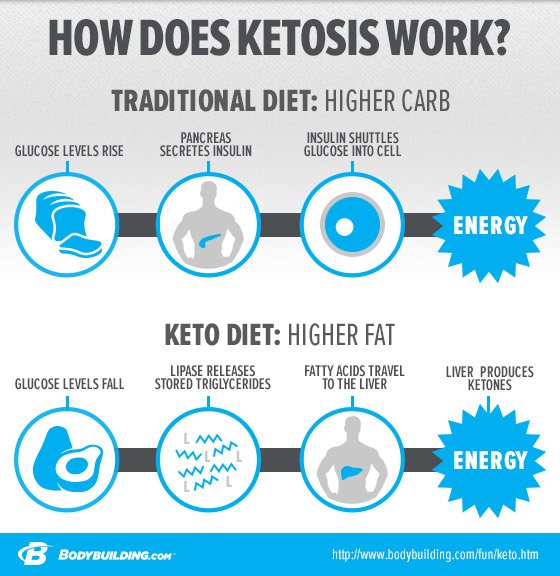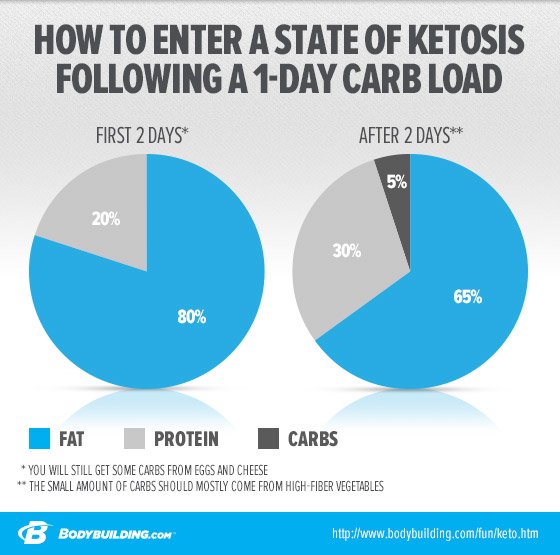cloudstrife1218
MuscleChemistry Registered Member
What exactly is Ketosis? The metabolic state of ketosis simply means that the quantity of ketone bodies in the blood have reached higher than normal levels. When the body is in a ketogenic state this means that lipid energy metabolism is intact. This means that the body will start breaking down your own body fat to fuel the body's normal, every day functions.
[h=3]WHAT'S SO GREAT ABOUT BEING IN KETOSIS?[/h]Establishing this metabolic state of ketosis even for a short period of time has many outstanding benefits.
[h=5]BENEFIT 1[/h]
 The main benefit being that it increases the body's ability to utilize fats for fuel, which gets very lazy on a high carbohydrate diet. When on high carbohydrate diets the body can usually expect an energy source to keep entering the body. But in the state of ketosis the body has to become efficient at mobilizing fats as energy.
The main benefit being that it increases the body's ability to utilize fats for fuel, which gets very lazy on a high carbohydrate diet. When on high carbohydrate diets the body can usually expect an energy source to keep entering the body. But in the state of ketosis the body has to become efficient at mobilizing fats as energy.
[h=5]BENEFIT 2[/h]Another nifty thing about being in a state of ketosis is that if the body has no further use for ketones they can simply be excreted through urine as a waste product. This means that at times your body will be peeing out body fat! This is a novel theme because your body is efficient at storing energy substrates for later use.
[h=5]BENEFIT 3[/h]Ketosis has a protein sparing effect, assuming that you are consuming adequate quantities of protein and calories in the first place. Once in ketosis the body actually prefers ketones to glucose. Since the body has copious quanities of fat this means that there is no need to oxidize protein to generate glucose through gluconeogenesis.
 "KETOSIS HAS A PROTEIN SPARING EFFECT, ASSUMING THAT YOU ARE CONSUMING ADEQUATE QUANTITIES OF PROTEIN AND CALORIES IN THE FIRST PLACE."
"KETOSIS HAS A PROTEIN SPARING EFFECT, ASSUMING THAT YOU ARE CONSUMING ADEQUATE QUANTITIES OF PROTEIN AND CALORIES IN THE FIRST PLACE."
[h=5]BENEFIT 4[/h]Another benefit has to do with the low levels of insulin in the body, which causes greater lipolysis and free glycerol release compared to a normal diet when insulin is around 80-120. Insulin has a lipolysis blocking effect, which can inhibit the use of fatty acids as energy. Also when insulin is brought to low levels many beneficial hormones are released in the body such as growth hormone and other powerful growth factors.
[h=5]BENEFIT 5[/h]Another small but very important benefit about the ketogenic diet is that when in the state of ketosis, ketones seem to blunt hunger in many people. I mean honestly, what is not better than being on a low calorie diet and not being hungry all the time like you usually are such as on a high carbohydrate diet. Since on the ketogenic diet you have to consume a lot of fat, which hold 9 calories, you are not getting much food volume. This makes not being hungry a very good thing when on the diet. When you add such thermogenics like the ECA stack and prescription appetite suppressants you won't even think about your next meal. It's kind of funny that when the Atkins' diet first came out one of the early criticisms was that the diet blunted hunger too much! What, is it mandatory to be hungry on a reduced calorie diet?
[h=5]BENEFIT 6[/h]The last benefit has to do with the fact that a ketone body is an inefficient fuel source due to the fact that when the fatty acid is converted to a KB it contains 7 calories. This means that the normal pound of fat has less than 3,500 calories.
[h=3]WHERE IS THE SCIENTIFIC DATA?[/h]The state of ketosis is—for the most part—controlled by insulin, glucagon, and blood glucose levels. Insulin is one of the hormones that the pancreas secretes in the presence of carbohydrates. Insulin's purpose is to keep blood glucose levels in check by acting like a driver, pushing the glucose in the blood into cells. If insulin were not to be secreted, blood glucose levels would get out of control and this would not be good for the body.
 Glucagon is on the other side of the spectrum; it is insulin's antagonistic hormone. Glucagon is also secreted by the pancreas when insulin falls to quite low levels. This usually happens when a person skips meals, or does not consume adequate amounts of carbohydrates for an extended period of time. When this happens, glucagon is secreted by the pancreas to break down stored glycogen in the liver into a more usable form, glucose. But what happens if this continues and liver glycogen runs out? This is where the metabolic state of ketosis comes in, because the pancreas can also start breaking down free fatty acids into a usable energy substrate, also known as ketones, or ketone bodies.
Glucagon is on the other side of the spectrum; it is insulin's antagonistic hormone. Glucagon is also secreted by the pancreas when insulin falls to quite low levels. This usually happens when a person skips meals, or does not consume adequate amounts of carbohydrates for an extended period of time. When this happens, glucagon is secreted by the pancreas to break down stored glycogen in the liver into a more usable form, glucose. But what happens if this continues and liver glycogen runs out? This is where the metabolic state of ketosis comes in, because the pancreas can also start breaking down free fatty acids into a usable energy substrate, also known as ketones, or ketone bodies.
[h=3]WHAT IS A KETONE, OR A KETONE BODY (KB)?[/h]A Ketone Body (KB) is formed in the liver through the Krebs cycle, or the citric acid cycle. When there is no glycogen for the body to run off of, the pancreas releases glucagon. Glucagon is a catabolic hormone, since it is used to break down body tissues for energy. In our case, glucagon is very important since it is used to convert free fatty acids into the energy substrate called a ketone. Ketones are free fatty acids broken down through a process that involves carnitine and glucagon. After the free fatty acids are processed in the liver the fats have been transformed into beta-hydroxybutyric and aceto-acetic acids, or, what you and I know them as, "ketones".
[h=3]DOES BEING IN THE METABOLIC STATE OF KETOSIS PRESENT DANGERS?[/h]The benefits of the ketogenic diet heavily outweigh the few pitfalls it may have. Some of the points of arguments are:
[h=5]PITFALL 1[/h]
 [COLOR=white !important]"DURING THE 'METABOLIC SHIFT,' THE BODY WILL EXPERIENCE A SMALL DEGREE OF FATIGUE AND BRAIN FOG."[/COLOR]
[COLOR=white !important]"DURING THE 'METABOLIC SHIFT,' THE BODY WILL EXPERIENCE A SMALL DEGREE OF FATIGUE AND BRAIN FOG."[/COLOR]
During the first few weeks of the ketogenic diet the body has to go through the "metabolic shift," as Mauro DiPasquale calls it. While going through this the body will experience a small degree of fatigue and brain fog, but—once the body gets used to manufacturing ketones as the main energy substrate—the body actually has more energy than it previously had, and you won't have to be fighting through all those low blood sugar crashes that your high-carb meals previously gave you. Also when in ketosis, ketones are the preferred energy substrate for the brain, over protein.
[h=5]PITFALL 2[/h]Blood lipid profile is also a concern on the ketogenic diet due to the staggering amounts of saturated fats in the diet, although the diet can be centered around healthy fats—which isn't as fun as eating an egg and cheese omelet, fried in butter, with bacon on the side! The issue of blood lipid profile is experiencing much debate; some people following the ketogenic diet will experience a drop in cholesterol levels, but for some people, cholesterol levels will increase.
[h=5]PITFALL 3[/h]Another point is that since carbohydrates are so restricted during the no carbohydrate portion, the issue of micronutrient deficiencies can occur. The best thing to do to avoid this is to make sure you take a high quality multivitamin /mineral twice per day to ensure that you get 100% of the daily value. Also supplementing with a fiber supplement is a good idea to make sure your plumbing doesn't get clogged, if you know what I mean. Another course of action one can take is to make sure that on the high-carbohydrate period of the diet you consume adequate amounts of fibrous green vegetables, and also quality carbohydrate sources such as brown rice, squash, sweet potatoes, and whole-wheat pastas.
[h=5]PITFALL 4[/h]This last focus point is the danger of ketoacidosis. This occurs when the level of ketones in the blood gets out of control, this happens because ketones are acidic only as long as they are floating around waiting to be burned. If the level of ketones in the blood rises out of control, it could lower the pH of the blood and this could result in death. But, this is not a concern for the non-diabetic; for the non-diabetic, blood sugar levels are kept low by our bodies and the body will only allow so many ketones to be manufactured at one time. In the diabetic person, blood sugar can rise as high as 300-2000mg/dl; normal levels are around 80-120. Also when this happens, the low insulin to glucagon ratio causes ketogenesis to be stimulated; this is where the person can run into ketoacidosis.
[h=3]WHAT ABOUT THE ANTI CATABOLIC EFFECTS OF THE KETOGENIC DIET?[/h]Every reduced calorie diet is catabolic, which means the diets can cause you to lose muscle. It's a fact! This is largely due to the fact that on a reduced-calorie diet many of the anabolic hormones in the body are significantly reduced. Added to that, most dieters do copious amounts of aerobic exercise when dieting; this is a very good way to catabolize muscle. So the main thing we can try to do is lose the least amount of muscle possible when dieting, or even possibly rebuild lost tissue, which is where the carb-up comes in. But that will not be discussed in this chapter.
Other than hormonal reasons, the main reason why catabolism occurs is because protein will be broken down, or catabolized, to make glucose. This is because the brain uses a boatload of glycogen, upward of 25% of the body's glucose. When carbohydrates are restricted, the body will still need glucose for the brain, so it is forced to break down protein mostly from existing muscle tissue.
 "WHEN IN THE STATE OF KETOSIS, THE BRAIN WILL PREFER KETONES OVER GLUCOSE. FOR THE DIETER THIS IS GOOD! THE BODY WILL NOT HAVE TO BREAK DOWN PROTEIN FOR ENERGY."
"WHEN IN THE STATE OF KETOSIS, THE BRAIN WILL PREFER KETONES OVER GLUCOSE. FOR THE DIETER THIS IS GOOD! THE BODY WILL NOT HAVE TO BREAK DOWN PROTEIN FOR ENERGY."
Ketosis is different, because, when in the state of ketosis, the brain will prefer ketones over glucose. For the dieter this is good! The body will not have to break down protein for energy. In turn the body will be forced to use its fat reserves, a.k.a. your love handles, for its energy. This is why ketosis is such a good method of dieting.
[h=3]SO WHAT IS THE BEST WAY TO GET THERE?[/h]Ultimately the best way to get into ketosis is to incorporate the use of performance enhancers into the diet. But that is a topic for a later chapter, for now I will explain the best way to get into ketosis using mostly dietary tricks.
Through experimentation I have found that the best way to get into the metabolic state of ketosis is starting off using a fairly high fat intake with small amounts of protein. After your body gets into ketosis I feel that the fat intake can be reduced and the protein intake can be increased.
During the first two days after the carb-up, I suggest the dieter use a ratio of 80% fat, 20% protein, and no carbs, except the small amounts in eggs, and the small amount in cheese. Due to the low amounts of protein, insulin will drop faster, because protein can be converted in to glucose with about 58% efficiency, allowing the dieter to reach ketosis quicker. After those two days the ratios are going to change slightly because the body will need more protein for muscle tissue.
 After the two days the dieter should change the ratios to 65% fat, 30% protein, and 5% carbs. This will ensure that the dieter stays in ketosis but also has enough protein for the muscles. The small amounts of carbs should mostly come from high-fiber veggies to ensure adequate bowel movements.
After the two days the dieter should change the ratios to 65% fat, 30% protein, and 5% carbs. This will ensure that the dieter stays in ketosis but also has enough protein for the muscles. The small amounts of carbs should mostly come from high-fiber veggies to ensure adequate bowel movements.
The no-carb period can be used longer causing the carb-up to be more infrequent, but for most people the carb-up will be Friday night and all day Saturday. Before Friday's workout, we want to ensure maximal glycogen super compensation. To do this the dieter is going to drop his amounts of saturated fats and make sure that his intake is only of quality fats. This is due to the effects that saturated fats have on insulin sensitivity.
Also around two hours before the workout the dieter should consume a small amount of carbs, a PowerBar will work well in this situation. This is so the body will not be running off ketones and blood glucose will be able to drop lower than the normal state of ketosis, which is around 50-60. This is important due to the fact that the lower the blood glucose in the body, the more of an anabolic effect the carb-load will have on the muscles. This is important because the main goal of the carb-up is to rebuild any muscle loss that occurred during the week, and we want all the possible carbs available for muscular anabolism to occur. But the main science about glycogen super compensation is to come later in my book.
- - - Updated - - -
Keto has always been a Go-To for a lot of us. I know this is an evil site I got this from, but the science and data is spot on, and I really like the author. Knowledgeable guy.
[h=3]WHAT'S SO GREAT ABOUT BEING IN KETOSIS?[/h]Establishing this metabolic state of ketosis even for a short period of time has many outstanding benefits.
[h=5]BENEFIT 1[/h]

[h=5]BENEFIT 2[/h]Another nifty thing about being in a state of ketosis is that if the body has no further use for ketones they can simply be excreted through urine as a waste product. This means that at times your body will be peeing out body fat! This is a novel theme because your body is efficient at storing energy substrates for later use.
[h=5]BENEFIT 3[/h]Ketosis has a protein sparing effect, assuming that you are consuming adequate quantities of protein and calories in the first place. Once in ketosis the body actually prefers ketones to glucose. Since the body has copious quanities of fat this means that there is no need to oxidize protein to generate glucose through gluconeogenesis.

[h=5]BENEFIT 4[/h]Another benefit has to do with the low levels of insulin in the body, which causes greater lipolysis and free glycerol release compared to a normal diet when insulin is around 80-120. Insulin has a lipolysis blocking effect, which can inhibit the use of fatty acids as energy. Also when insulin is brought to low levels many beneficial hormones are released in the body such as growth hormone and other powerful growth factors.
[h=5]BENEFIT 5[/h]Another small but very important benefit about the ketogenic diet is that when in the state of ketosis, ketones seem to blunt hunger in many people. I mean honestly, what is not better than being on a low calorie diet and not being hungry all the time like you usually are such as on a high carbohydrate diet. Since on the ketogenic diet you have to consume a lot of fat, which hold 9 calories, you are not getting much food volume. This makes not being hungry a very good thing when on the diet. When you add such thermogenics like the ECA stack and prescription appetite suppressants you won't even think about your next meal. It's kind of funny that when the Atkins' diet first came out one of the early criticisms was that the diet blunted hunger too much! What, is it mandatory to be hungry on a reduced calorie diet?
[h=5]BENEFIT 6[/h]The last benefit has to do with the fact that a ketone body is an inefficient fuel source due to the fact that when the fatty acid is converted to a KB it contains 7 calories. This means that the normal pound of fat has less than 3,500 calories.
[h=3]WHERE IS THE SCIENTIFIC DATA?[/h]The state of ketosis is—for the most part—controlled by insulin, glucagon, and blood glucose levels. Insulin is one of the hormones that the pancreas secretes in the presence of carbohydrates. Insulin's purpose is to keep blood glucose levels in check by acting like a driver, pushing the glucose in the blood into cells. If insulin were not to be secreted, blood glucose levels would get out of control and this would not be good for the body.

[h=3]WHAT IS A KETONE, OR A KETONE BODY (KB)?[/h]A Ketone Body (KB) is formed in the liver through the Krebs cycle, or the citric acid cycle. When there is no glycogen for the body to run off of, the pancreas releases glucagon. Glucagon is a catabolic hormone, since it is used to break down body tissues for energy. In our case, glucagon is very important since it is used to convert free fatty acids into the energy substrate called a ketone. Ketones are free fatty acids broken down through a process that involves carnitine and glucagon. After the free fatty acids are processed in the liver the fats have been transformed into beta-hydroxybutyric and aceto-acetic acids, or, what you and I know them as, "ketones".
[h=3]DOES BEING IN THE METABOLIC STATE OF KETOSIS PRESENT DANGERS?[/h]The benefits of the ketogenic diet heavily outweigh the few pitfalls it may have. Some of the points of arguments are:
[h=5]PITFALL 1[/h]

During the first few weeks of the ketogenic diet the body has to go through the "metabolic shift," as Mauro DiPasquale calls it. While going through this the body will experience a small degree of fatigue and brain fog, but—once the body gets used to manufacturing ketones as the main energy substrate—the body actually has more energy than it previously had, and you won't have to be fighting through all those low blood sugar crashes that your high-carb meals previously gave you. Also when in ketosis, ketones are the preferred energy substrate for the brain, over protein.
[h=5]PITFALL 2[/h]Blood lipid profile is also a concern on the ketogenic diet due to the staggering amounts of saturated fats in the diet, although the diet can be centered around healthy fats—which isn't as fun as eating an egg and cheese omelet, fried in butter, with bacon on the side! The issue of blood lipid profile is experiencing much debate; some people following the ketogenic diet will experience a drop in cholesterol levels, but for some people, cholesterol levels will increase.
[h=5]PITFALL 3[/h]Another point is that since carbohydrates are so restricted during the no carbohydrate portion, the issue of micronutrient deficiencies can occur. The best thing to do to avoid this is to make sure you take a high quality multivitamin /mineral twice per day to ensure that you get 100% of the daily value. Also supplementing with a fiber supplement is a good idea to make sure your plumbing doesn't get clogged, if you know what I mean. Another course of action one can take is to make sure that on the high-carbohydrate period of the diet you consume adequate amounts of fibrous green vegetables, and also quality carbohydrate sources such as brown rice, squash, sweet potatoes, and whole-wheat pastas.
[h=5]PITFALL 4[/h]This last focus point is the danger of ketoacidosis. This occurs when the level of ketones in the blood gets out of control, this happens because ketones are acidic only as long as they are floating around waiting to be burned. If the level of ketones in the blood rises out of control, it could lower the pH of the blood and this could result in death. But, this is not a concern for the non-diabetic; for the non-diabetic, blood sugar levels are kept low by our bodies and the body will only allow so many ketones to be manufactured at one time. In the diabetic person, blood sugar can rise as high as 300-2000mg/dl; normal levels are around 80-120. Also when this happens, the low insulin to glucagon ratio causes ketogenesis to be stimulated; this is where the person can run into ketoacidosis.
[h=3]WHAT ABOUT THE ANTI CATABOLIC EFFECTS OF THE KETOGENIC DIET?[/h]Every reduced calorie diet is catabolic, which means the diets can cause you to lose muscle. It's a fact! This is largely due to the fact that on a reduced-calorie diet many of the anabolic hormones in the body are significantly reduced. Added to that, most dieters do copious amounts of aerobic exercise when dieting; this is a very good way to catabolize muscle. So the main thing we can try to do is lose the least amount of muscle possible when dieting, or even possibly rebuild lost tissue, which is where the carb-up comes in. But that will not be discussed in this chapter.
Other than hormonal reasons, the main reason why catabolism occurs is because protein will be broken down, or catabolized, to make glucose. This is because the brain uses a boatload of glycogen, upward of 25% of the body's glucose. When carbohydrates are restricted, the body will still need glucose for the brain, so it is forced to break down protein mostly from existing muscle tissue.

Ketosis is different, because, when in the state of ketosis, the brain will prefer ketones over glucose. For the dieter this is good! The body will not have to break down protein for energy. In turn the body will be forced to use its fat reserves, a.k.a. your love handles, for its energy. This is why ketosis is such a good method of dieting.
[h=3]SO WHAT IS THE BEST WAY TO GET THERE?[/h]Ultimately the best way to get into ketosis is to incorporate the use of performance enhancers into the diet. But that is a topic for a later chapter, for now I will explain the best way to get into ketosis using mostly dietary tricks.
Through experimentation I have found that the best way to get into the metabolic state of ketosis is starting off using a fairly high fat intake with small amounts of protein. After your body gets into ketosis I feel that the fat intake can be reduced and the protein intake can be increased.
During the first two days after the carb-up, I suggest the dieter use a ratio of 80% fat, 20% protein, and no carbs, except the small amounts in eggs, and the small amount in cheese. Due to the low amounts of protein, insulin will drop faster, because protein can be converted in to glucose with about 58% efficiency, allowing the dieter to reach ketosis quicker. After those two days the ratios are going to change slightly because the body will need more protein for muscle tissue.

The no-carb period can be used longer causing the carb-up to be more infrequent, but for most people the carb-up will be Friday night and all day Saturday. Before Friday's workout, we want to ensure maximal glycogen super compensation. To do this the dieter is going to drop his amounts of saturated fats and make sure that his intake is only of quality fats. This is due to the effects that saturated fats have on insulin sensitivity.
Also around two hours before the workout the dieter should consume a small amount of carbs, a PowerBar will work well in this situation. This is so the body will not be running off ketones and blood glucose will be able to drop lower than the normal state of ketosis, which is around 50-60. This is important due to the fact that the lower the blood glucose in the body, the more of an anabolic effect the carb-load will have on the muscles. This is important because the main goal of the carb-up is to rebuild any muscle loss that occurred during the week, and we want all the possible carbs available for muscular anabolism to occur. But the main science about glycogen super compensation is to come later in my book.
- - - Updated - - -
Keto has always been a Go-To for a lot of us. I know this is an evil site I got this from, but the science and data is spot on, and I really like the author. Knowledgeable guy.

